

When searching for bulging disc treatment, disc bulge surgery is typically considered. Surgery is frequently recommended for bulging discs in the spine when physical therapy and drugs fail. Disc bulge therapy relieves discomfort, numbness, and weakness produced by the bulging disc. Removing the bulging disc surgery may reduce spinal nerve pressure, making the individual more flexible and less uncomfortable. Consult a doctor to determine whether disc bulging surgery is correct for you. This is because each instance requires a customised treatment regimen.
However availaing quality bulging disc treatment at affordable prices is one of the most common problems that a number of African patients face. This has led to the rise in the trend of medical tourism, especially to countries like India. That is because India has become one of the best countries for availing the best quality spinal treatments at cost-effective prices. Discover the benefits, procedure, and recovery process for undergoing bulging disc treatment in India with this page.
A damaged or weak spinal disc top layer pushes the gel-like substance outward. This is a bulging disc. It may push on adjacent nerves, causing pain, numbness, or weakness. A bulging disk resembles a crushed jelly doughnut. Jelly presses on the dough, bulging it. It may happen anywhere in the spine, but usually in the lower back and neck. Ageing, poor posture, or repetition may produce a bulging disc. Treatment options vary from physical therapy and drugs to surgery, depending on the severity of the symptoms and the patient's health. If you suspect a bulging disc, consult a doctor immediately for a diagnosis and a customised treatment plan.
A bulging disc in the neck in your lower back has several causes. Age-related spinal disc wear is a common cause. The top layer weakens with time. Bad posture, particularly while sitting or lifting heavy objects, may stress the lower back discs and cause bulging discs. Moving, bending, rotating, or repeatedly bending may also bulge spine discs.
Falling or being in a vehicle collision may also cause bulging discs in the lower back. The force of the crash may shift the discs out of position, placing pressure on adjacent nerves and producing leg discomfort, stiffness, or paralysis. Surgery may be the final resort for a bulging lower back disc if physical therapy and medication fail. Surgery relieves muscular strain and stabilises the spine when a lower back disc bulges, improving symptoms and function.
Remember that a bulging disc in the lower back might be uncomfortable and make daily life difficult, but it can be repaired. Get medical attention immediately and follow a thorough treatment plan that may involve physical therapy, drugs, or bulging disc surgery to manage symptoms and expedite recovery. A healthy lifestyle, including regular exercise and correct body motions, helps prevent neck and lower back spinal disc disorders.
Mild to severe pain worsens when coughing, leaning over, or raising. Because of the bulging disc, the pain may remain in the lower back or neck or migrate to other areas.
The bulging disc presses on adjacent nerves, causing arm, hand, leg, and foot pain or tingling. This sensation is termed paresthesia and may be permanent or intermittent. Sometimes, it feels like pins and needles.
Weak muscles or problems walking, pulling, or executing everyday duties might indicate nerve pinching and function loss. Bulging disc pressure interrupts nerve transmissions, weakening muscle groups.
A swollen disc pressing on spine nerve roots often causes sciatica. This discomfort might follow the injured nerve, making the afflicted region feel terrible, numb, or weak.
The inability to regulate the bladder or bowels may indicate significant nerve compression and require immediate medical attention. A bulging spine disc may sometimes strain on the cauda equina nerves. Urinary or faecal incontinence and saddle numbness may indicate an emergency. Treatment for bulging disc in the spine commonly involves physical therapy, drugs, and surgery to relieve symptoms and restore spine function. If you have recurring or worsening bulging disc symptoms, you should consult a doctor to receive a proper diagnosis and treatment plan.
Patients with back discomfort commonly undergo MRI scans to identify a bulging disc. These tests show physicians where and how large the bulge is in the spine's soft tissues, such as the intervertebral discs. Muscle strength, sensation, and responses may be tested physically. This may identify nerve compression and related symptoms. Swollen discs may be discovered using neurological examinations, including reaction checks and straight leg lift tests. MRIs, CT scans, and medical history and symptoms are crucial for confirming a bulging disc and determining the appropriate spine disc bulge treatment for each patient.

Even though both involve spinal disc issues, swollen and herniated discs vary in fundamental ways. Weakening of the annulus fibrosus causes a bulging disc. The nucleus pulposus, the gel-like substance within, pushes outward, bulging the disc. The disc bulges, yet the top layer does not rupture or explode.
However, a bulging disc occurs when the gel-like substance within bursts through the top layer, creating a rip or hole. The core material may herniate from the disc, putting pressure on adjacent nerves and worsening symptoms. Herniated discs often produce more pain, stiffness, and weakness than bulging discs because the ruptured material might inflame surrounding nerve roots. The protruding disc may stress the spinal cord or nerve roots, worsening symptoms.
Remember that bulging discs happen more regularly yet may not be painful. Swollen discs may not strain on nerves; therefore, the individual may not experience discomfort. Herniated discs, however, often create visible and unpleasant symptoms, including dizziness, muscular weakness, and extremity pain. The severity of symptoms depends on the protrusion's size, position, and nerves. Both disorders may occur anywhere in the spine, typically in the neck and lower back. Since swollen and compressed disc treatments vary, getting medical aid immediately is crucial for diagnosing and treating each ailment.
A bulging disc may be painful, but you will find relief with the bulging disc treatment in India. Here are the most typical steps that are followed for the procedure:
A laminotomy or laminectomy removes a tiny section of the lamina bone between vertebrae to create space for the spinal cord and nerves. This may relieve swollen disc discomfort. The surgeon will gently remove the injured lamina via a tiny back incision. People with chronic or long-term issues who don't respond to less intrusive therapies are generally advised to undergo this procedure.
Spinal fusion is more invasive. This may stabilise the spine and prevent disc bulging or herniation. A bone transplant or artificial implant will replace the fractured disc to help the spine develop. Spinal fusion is recommended for those with severe, incapacitating symptoms or unstable spines.
Artificial disc surgery, also termed complete disc replacement, is a revolutionary back pain treatment. The damaged disc is replaced with an artificial graft. This therapy maintains spine mobility and may be suitable for some. The doctor will replace the fractured disc with a metal or plastic one during surgery. Younger persons with single disc problems are generally advised to undergo this surgery.
Remember that the bulging disc's severity, the patient's health, and the doctor's advice will determine the therapy. Physical therapy, medication, and lifestyle modifications are often explored before surgery.
See an expert orthopaedic or specialist immediately if you suspect a bulging disc. Doctors will assess your problem and suggest a solution.
Rest, exercise, and progressively resume your activities after your bulging disc treatment in India. Patients may first experience discomfort and have problems moving. Physical therapy and medications help. To ensure adequate spine healing, follow the healthcare team's post-surgery instructions, which may restrict movement, bending, and twisting. Physical therapy helps strengthen, flex, and restore spine muscles. Patients should gradually increase their exercise to maintain balance and bodily functioning and prevent back issues. Full recovery following bulging disc surgery relies on health, operation extent, and rehabilitation plan compliance. Most individuals may expect to improve their symptoms and function with proper treatment and devotion to rehabilitation.
CureIndia helps you connect with the best doctors for bulging disc treatment in India. The experienced spinal experts at CureIndia provide advanced treatment plans for bulging discs, including non-surgical therapies and minimally invasive procedures. CureIndia offers all-inclusive care, from initial assessments and personalised treatment plans to post-treatment follow-ups. Let us hear from the leading doctors for bulging disc treatment in India.
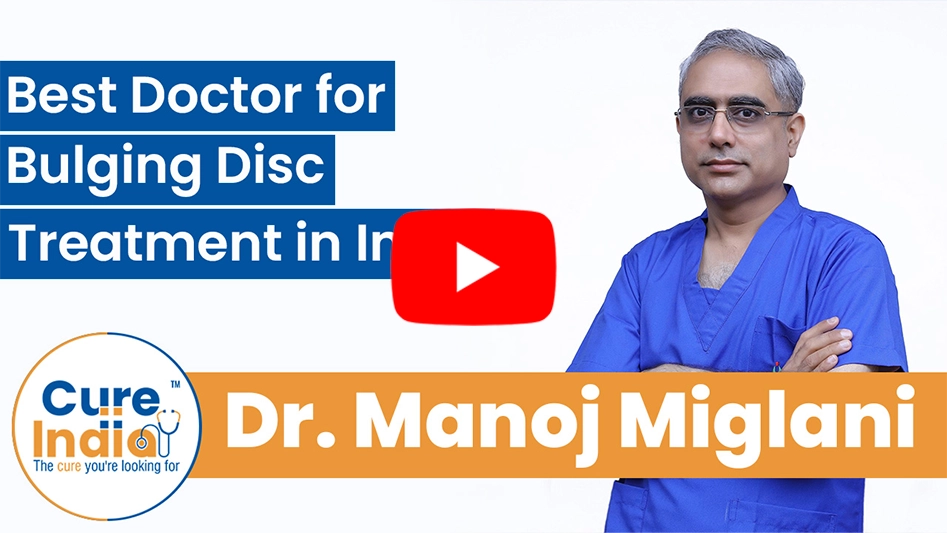
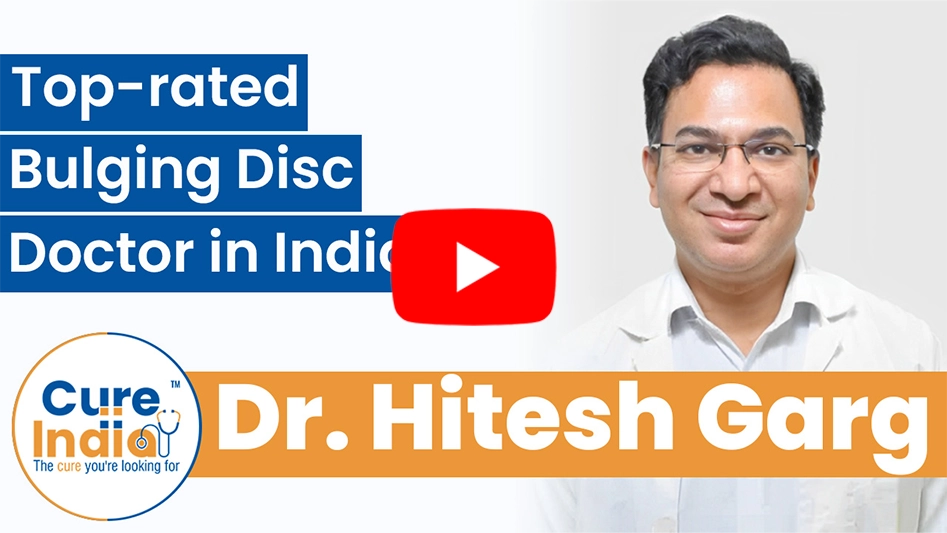
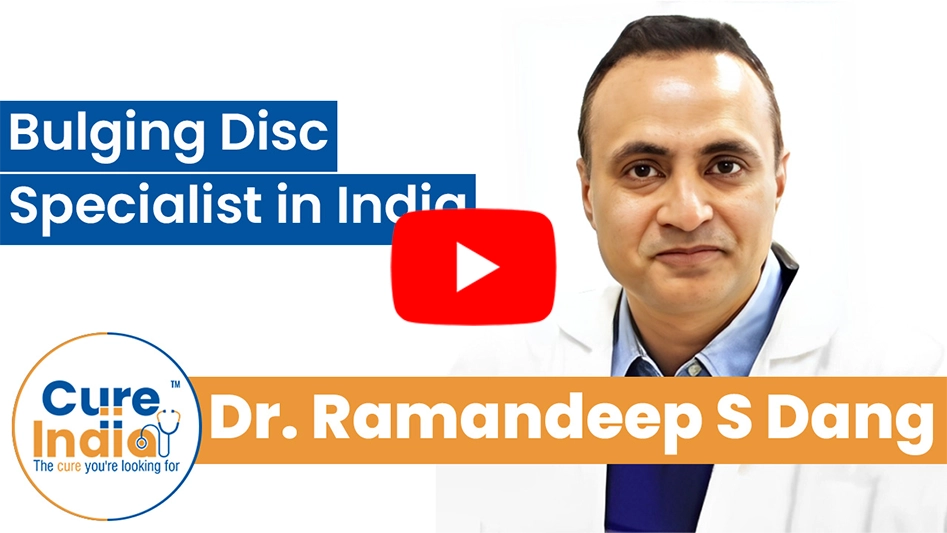
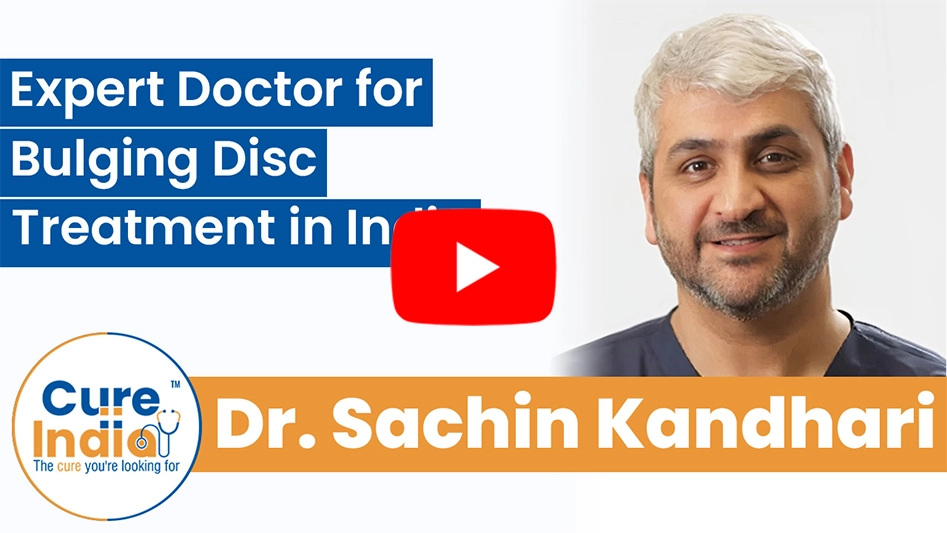
What you pay for bulging disc surgery in India depends on where you reside, the facility you select, the surgeon's expertise, and the treatment you require.
Search results indicate that the bulging disc surgery cost in India ranges from around $2,200 to $4,400. Prices vary according to the variety of hospitals throughout the nation. Private and state hospitals do surgery. People who desire excellent private hospital treatment or difficult operations may pay extra. Using specialist surgical instruments or innovative approaches may potentially increase costs. The treatment cost may include medical testing, medications, and pre-and post-surgery physical therapy. After seeing the surgeon, the cost will be determined. Depending on the patient's medical condition and treatment plan, the surgeon may provide a more accurate price.
| Treatment Name | Cost in India | Stay in India |
|---|---|---|
| TLIF Bulging Disc Treatment in India | $5,500 - $6,500 | 7 Days |
| Minimally invasive TLIF Bulging Disc Treatment in India | $6,500 - $7,500 | 7 Days |
| Spinal Fusion Bulging Disc Treatment in India | $5,500 - $6,500 | 7 Days |
A bulging disc treatment in India help many patients find relief from severe discomfort associated with a bulging or compressed disc. Surgery doesn't eliminate all symptoms but can improve leg and back pain, function, and quality of life. Not all cases need disc bulge treatment. Some patients may recover without surgery with physical therapy, medication, or spinal injections. Before undergoing a disc bulge surgery, patients should consider their condition, symptoms, risks, and benefits. Whatever the therapy decided, the objective is to reduce pain and enhance health. Carefully consider your treatment alternatives with a skilled healthcare provider.

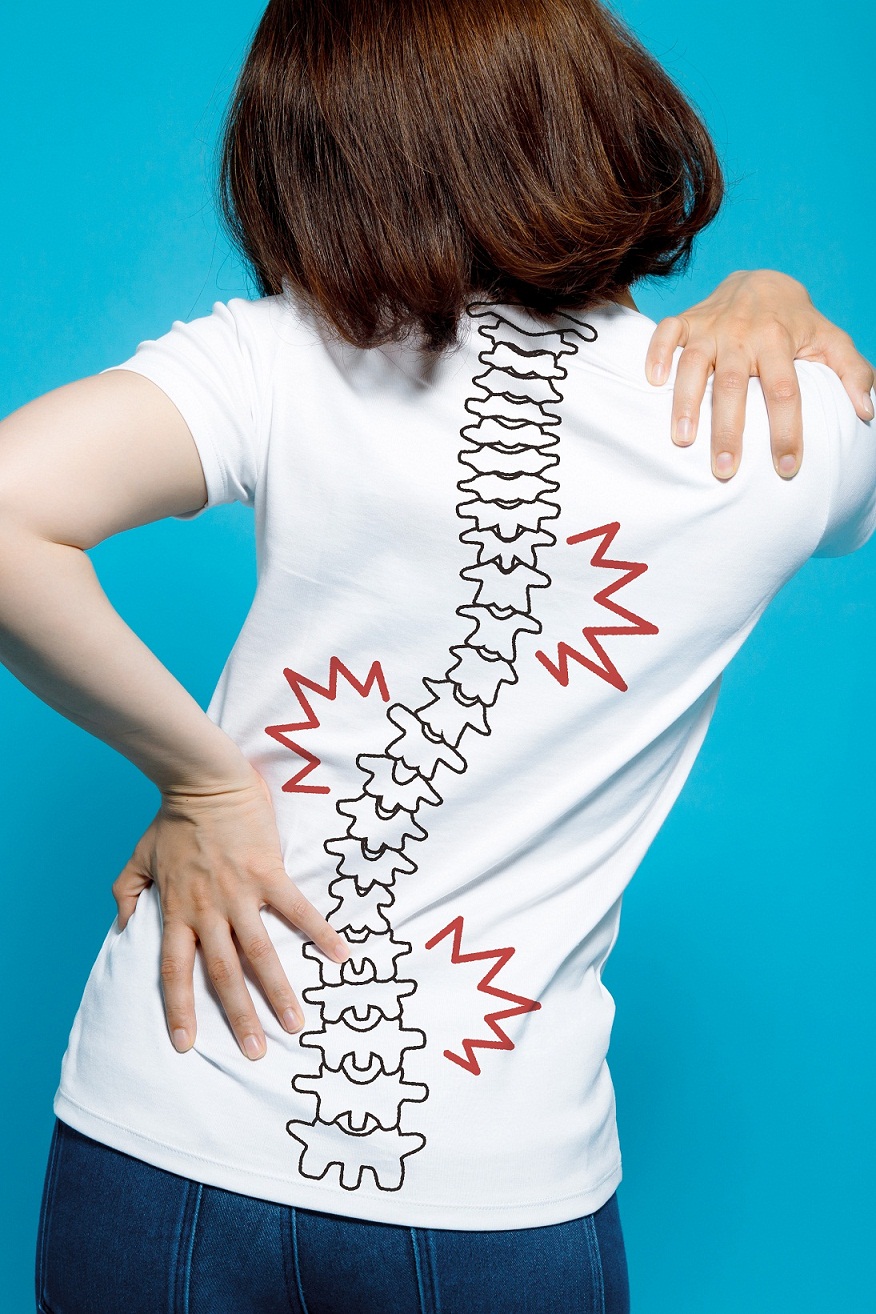
Spinal Fusions, Decompressions and Deformity Corrections
Share Your Reports
Internationally Trained Spine Surgeons
Get an opinion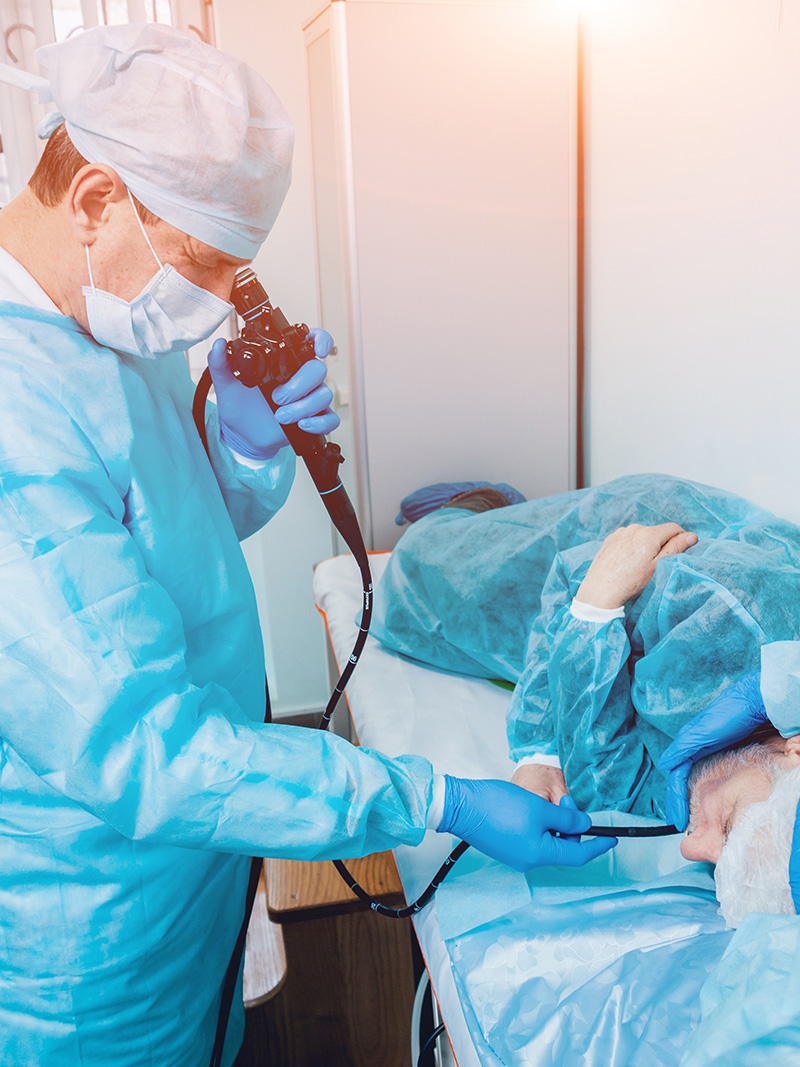
OAM Navigation, Microscopic and Neuro Monitoring Techniques
Plan Your Surgery